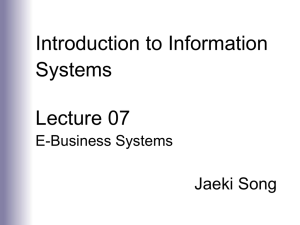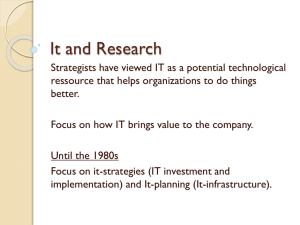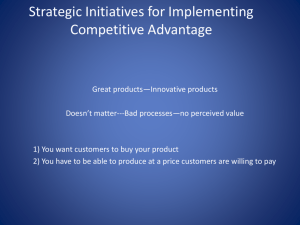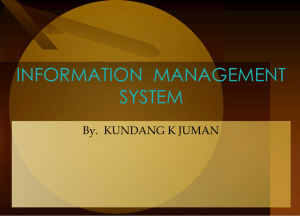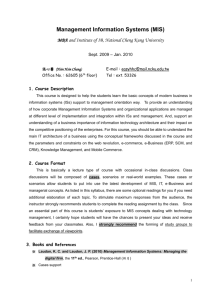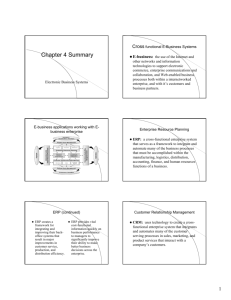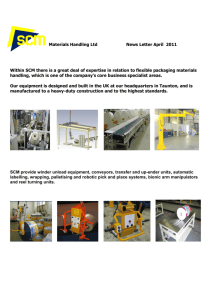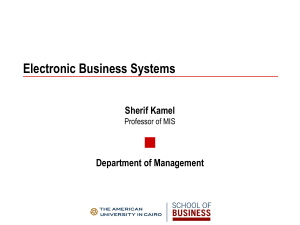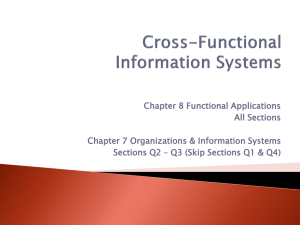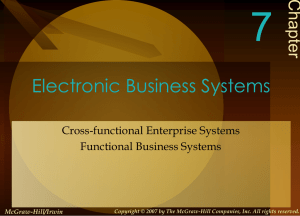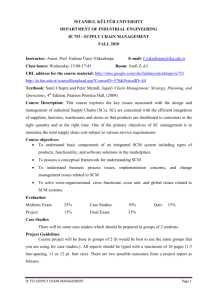Enterprise Business Systems
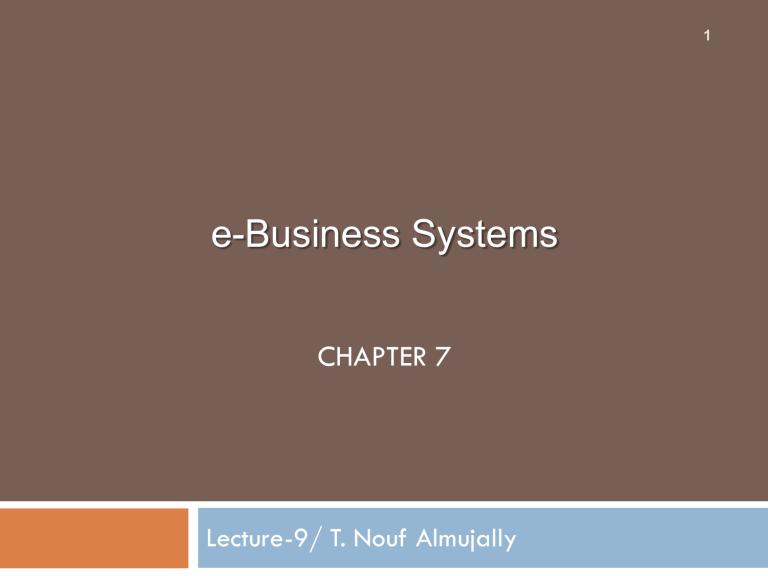
e-Business Systems
CHAPTER 7
Lecture-9/ T. Nouf Almujally
1
Outline
•
•
•
•
•
•
•
•
•
Section 1 (Enterprise Business Systems):
Cross-Functional Enterprise Applications
Getting All the Geese Lined Up: Managing at the Enterprise Level
Customer Relationship Management: The Business Focus.
What is CRM?
The Three Phases of CRM
•
Benefits and Challenges of CRM (not required)
CRM Failures (not required)
Enterprise Recourse Planning: The Business Backbone
What is ERP?
•
Benefits and Challenges of ERP
Causes of ERP Failures (not required)
Outline
•
•
•
•
•
•
•
Section 1 (Enterprise Business Systems):
Supply Chain Management: The Business Network.
•
What is CRM?
Electronic Data Interchange (not required)
The Role of SCM
(not required)
Benefits and Challenges of SCM (not required)
Enterprise Application Integration
Transaction Processing Systems.
Enterprise Collaboration Systems
•
Section 2:
Functional Business Systems summarized in Figure 7.24
(required only)
Learning Objectives
•
Identify these cross-functional enterprise systems, and give examples of how they can provide business value to a company
•
•
•
•
•
•
Enterprise Resource planning
Customer Relationship Management
Supply chain management
Enterprise application integration
Transaction processing systems
Enterprise collaboration systems
Supply Chain Management (SCM)
The Business Network
Supply Chain Management (SCM)
•
•
•
•
•
•
Supply chain management helps a company
Get the right products
To the right place
At the right time
In the proper quantity
At an acceptable cost
What is SCM ?
•
•
Supply chain management: is a cross-functional interenterprise system that use IT to integrates and automates the network of business processes and relationships between a company and its suppliers, customers, distributors, and other business partners.
SCM create a fast, efficient, and low-cost network of business relationships, or supply chain to get a company’s products from concept to market.
Goals of SCM
Forecast demand Control inventory
Enhance company
Relationships with customers, suppliers, distributors, and others
Receive feedback on the status of every link in the supply chain
What is a company’s Supply Chain?
Supply Chain:
•
•
•
The interrelationships
With suppliers, customers, distributors, and other businesses
Needed to design, build, and sell a product makeup the network of business entities, relationships and processes.
•
Because each supply chain process should add value to the products or services a company produces, a supply chain is Frequently called a “value chain”.
Supply Chain Life Cycle
Goals and Objectives of SCM
Enterprise Application Integration
How does a business interconnect its cross-functional enterprise systems?
Enterprise application integration (EAI) software is being used to connect major e-business applications.
•
•
1.
EAI software connects a variety of enterprise systems by letting them exchange data.
Serves as middleware that perform:
Data conversion
2.
3.
Application Communication and messaging services between systems
Access to system interfaces
How EAI Works
Transaction Processing Systems
•
Transaction Processing Systems: are Cross-functional information systems that process data resulting from the occurrence of business transactions.
•
•
Transactions are events that occur as part of doing business, such as sales, purchases, deposits, withdrawals, refunds, and payments
Online transaction processing (OLTP) is a real-time system that captures transactions immediately.
The Transaction Processing Cycle
Enterprise Collaboration Systems (ECS)
•
•
•
•
•
EC systems are cross-functional information systems that support and enhance team and workgroup:
Communication
Coordination
Collaboration
•
•
•
•
Systems may include:
Networked PC workstations
Servers
Databases
Groupware and application packages
ECS Tools
Functional Business Systems
Various types of information systems that support the business functions of …
Accounting
Finance
Marketing
Operations management
Human resource management
IT in Business
Read from Chapter 7 (Section 1)
